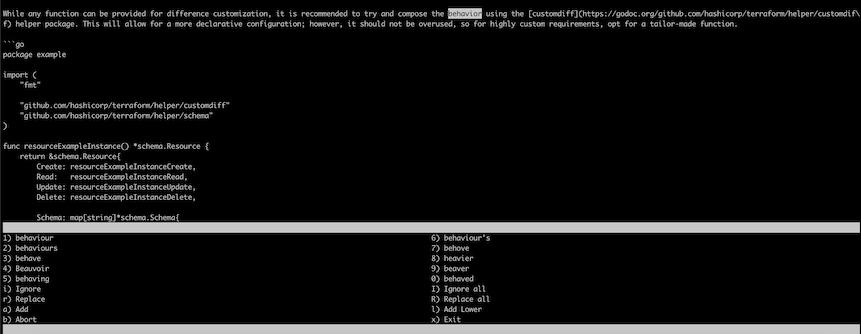Fixing common spelling errors with misspell
I’ve been writing a lot of documentation recently, so I’ve been looking at ways of detecting spelling mistakes.
The main spelling tool you’ll find is Aspell, and it works fine.
With a little bit of shell scripting, you can generally point it at some text and it’ll find mispellings: find ./content/source/ -maxdepth 5 -name "*.md" -exec aspell -x -c {} \;
You’ll see something like this:

The problem with this is… you’re going to have to spend a lot of time adding custom words to a dictionary with your avergage documentation repo. It’s going to have code examples, acronyms and a lot of proper nouns. Aspell allows you to add the words to a custom dictionary that’s kept at ~/.aspell.en.pws
I started running it through the terraform-website repo and started adding words as I went, but it seemed to be an unending task:
$ cat ~/.aspell.en.pws
personal_ws-1.1 en 157
thumbnailImage
MPL
urls
uglyurls
javascript
SSL
uncomment
ACM
AWS
vDM
md
PrettyUrls
CDN
HashiCorp
Hacky
toml
systemd
hugo
MERCHANTABILITY
xyz
html
terraform
showPagination
sublicense
petersouter
showActions
showDate
showMeta
coverImage
This was taking a long time, and it was taking forever to add in all the excepts
What if instead of trying to correct everything that looks like a mispelt word, we only look for common mispellings of words?
The alternative approach with mispell
This is the approach misspell uses: it takes a list of common misspelling of words, then replaces them with the correct spelt word.
abandonned->abandoned
aberation->aberration
abilityes->abilities
abilties->abilities
abilty->ability
abondon->abandon
https://en.wikipedia.org/wiki/Wikipedia:Lists_of_common_misspellings/For_machines
This a lot more efficient than having to add all the exceptions: there is a lot of existing data on mispellings, and we can even add in new ones we find in the future.
It’s also a lot more performant as we’re doing a simple substituation from a list, rather than having to do any sort of word comparison:
Misspell is easily 100x to 1000x faster than other spelling correctors. You should be able to check and correct 1000 files in under 250ms. This uses the mighty power of golang’s strings.Replacer which is a implementation or variation of the Aho–Corasick algorithm. This makes multiple substring matches simultaneously. In addition this uses multiple CPU cores to work on multiple files. https://github.com/client9/misspell#performance
And it’s a lot better for documentation repos as we don’t have a bunch of false positives for proper nouns, acronyms and technology terms.
I did a quick run against the terraform-website repo and it worked like a charm:
$ docker run \
-v $(pwd):/scripts \
--workdir=/scripts \
nickg/misspell:latest \
misspell -w -source=text content/
docker run \
> -v $(pwd):/scripts \
> --workdir=/scripts \
> nickg/misspell:latest \
> misspell -w -source=text content/
content/source/docs/enterprise/api/modules.html.md:74:89: corrected "Conection" to "Connection"
content/source/docs/enterprise/api/oauth-tokens.html.md:11:100: corrected "assocaited" to "associated"
content/source/docs/enterprise/api/workspaces.html.md:308:110: corrected "Conection" to "Connection"
content/source/docs/enterprise/getting-started/policies.html.md:9:65: corrected "sucessfully" to
So I added a quick target to the Makefile, replacing $(pwd) with Make’s $(CURDUR):
spellcheck:
@echo "==> Spell checking website and running fixes..."
@docker run \
-v $(CURDIR):/scripts \
--workdir=/scripts \
nickg/misspell:latest \
misspell -w -source=text content/
@echo "==> Spell check complete"
But this threw up some errors with the simlinks in the repo from the submodules:
2018/12/22 11:06:48 Unable to stat "content/source/docs/backends": stat content/source/docs/backends: no such file or directory
2018/12/22 11:06:48 Unable to stat "content/source/docs/commands": stat content/source/docs/commands: no such file or directory
2018/12/22 11:06:48 Unable to stat "content/source/docs/configuration": stat content/source/docs/configuration: no such file or directory
So, with a bit of experimenting, a find and some xargs, I found a better solution.
find . -type f only returns files, not simlinks. So we can send this to the docker command with xargs and hey-presto: We have a working spellcheck!
spellcheck:
@echo "==> Spell checking website and running fixes..."
@find content/ -type f | xargs docker run \
-v $(CURDIR):/scripts \
--workdir=/scripts \
nickg/misspell:latest \
misspell -w -source=text
@echo "==> Spell check complete"
Task complete, I opened up a PR with the new make task and the spelling fixes. Job’s a goodun!